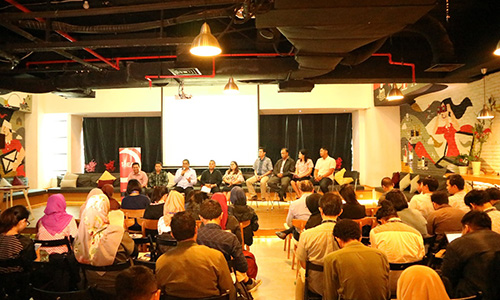Support
Support

idEA Ask Government to Conduct Public Test RPMK Tax E-Commerce
Jakarta, January 30, 2018 - The Indonesian E-Commerce Association (idEA) asks the Minister of Finance to conduct a public test of the draft Regulation of the Minister of Finance on the Procedure of Taxation of Electronic Commerce-Based Business Entities (RPMK Tax E-Commerce) prior to issue.
"Public test of RPMK of E-Commerce Tax document must be done before it is legalized so that the formal and material principles of formulating the regulation come into being. So far, what has been submitted to us is a socialization of concept and not a draft of the PMK. Verbal and / or written suggestions and suggestions from stakeholders such as e-commerce, academic and community-wide entrepreneurs delivered at the time of public examination constitute a unity that must be carried out at the time of formation of a policy. "Aulia E. Marinto, Chairperson idEA "In addition, public participation is important to ensure that the policy does not hamper the growth rate of e-commerce business actors, especially those in the marketplace."
"Considering that most business actors in the marketplace are small-scaled business entrepreneurs who are just starting their business, in principle idEA supports if in the RPMK of E-Commerce Tax applied the Final Income Tax rate of 0.5% for business actors who have a dirty business circulation up to 4.8 billion rupiah a year. Implementation of taxation rules is needed to encourage offline SMEs to transform into online SMEs, facilitate tax collection in the future, while improving efficiency and competitiveness of Micro MSMEs in Indonesia "added Aulia.
According to Inayati, Academician and Expert of Taxation of the Faculty of Administrative Sciences of the University of Indonesia "Government policies that require a marketplace model to become a tax-paying agent have implications for increasing compliance costs or compliance costs. Because this policy will place the marketplace in the position of being obliged to cut, deposit and report the Final Income Tax. Increased compliance costs need to get Government attention because it can affect taxpayer compliance. Compliance costs become relatively significant because to carry out these obligations the marketplace must prepare a number of infrastructure and additional costs. "
This condition is different from Social Media which also provides space for business transactions, but not burdened with the same obligations. Similarly, the overseas platform which also earned income from Indonesia and until now is not burdened with any tax obligations. It is feared, with the different treatment of the Virtual NPWP that is only mandatory for e-commerce business actors in the marketplace model, and not required by business actors who do business in Social Media; this policy has the potential to make business actors abandon the marketplace model so that the goal of this policy is ultimately not achieved. On the other hand there are so many business actors who use Social Media that it can be an opportunity for the e-commerce tax policy to obtain comprehensive and maximum results. This is shown from the results of a survey conducted by IdEA to 1,800 respondents in 11 major cities in Indonesia (Yogyakarta, Makassar, Surabaya, Medan, Palembang, Pontianak, Balikpapan, Semarang, Solo and Denpasar) related to the distribution of business actors in various platform models.
Keep in mind, e-commerce is not merely a place to sell, but has become an important ecosystem for Indonesian MSME players to start and develop their business. In addition, ecommerce ecosystems have great potential in sustaining the growth of millions of SMEs in Indonesia. With the internet, anyone from students to housewives can become entrepreneurs with minimal capital. They can not only reach the broader market, but also create jobs for the surrounding communities and take an active role in moving the local economy. From the customer side, e-commerce also helps to facilitate public access to faster, easier and safer services. So in this policy setting, idEA hopes that e-commerce can be seen as the economic supporting ecosystem of the nation, rather than just as a place to sell.
The e-commerce marketplace model is one of the transaction channel models for various other channel types of transactions. Therefore, it is appropriate that this policy applies to all types of transaction channels existing and running on the market today without discriminating against each other, to ensure the growth of a healthier and more advanced e-commerce industry, both now and in the future.

Therefore idEA asks that the Government can guarantee the level playing field (fairness or equal treatment). "The Directorate General of Taxes (DGT) also needs to enforce other channels of business (marketplace informal) in Social Media and offline marketplace. Given the marketplace is expected to play a role in facilitating and assisting DGT in increasing the number of new Taxpayers including depositing taxes and providing data transactions online. If the level playing field (fairness) can not be executed, then this policy plan should be reviewed in order to be in accordance with the formal and material principles of the formulation of a regulation that must have an element of equity and equality, "said Bima Laga, Chief of Field Taxes, Cybersecurity, Infrastructure idEA.
Given the enormous potential of the e-commerce industry and the current developments, idEA, once again confirms that the public test of the RPMK of E-Commerce Tax must be implemented so that the input points can be considered by the Minister of Finance in perfecting the e-commerce taxation procedure . So that the perpetrators of the e-commerce industry can run its business according to the existing PMK, also able to develop optimally in order to maximize the contribution to the Indonesian economy.
translation-not-found[latest_article_idea]
01



